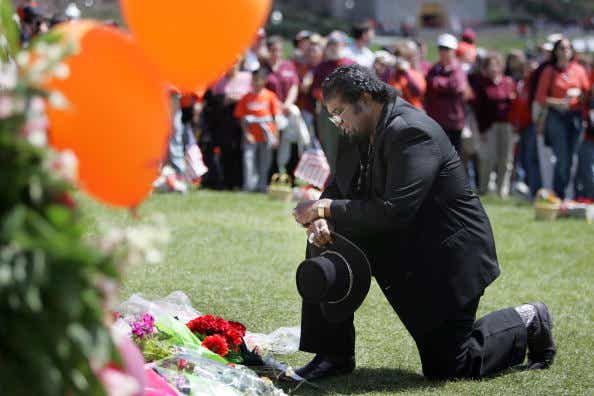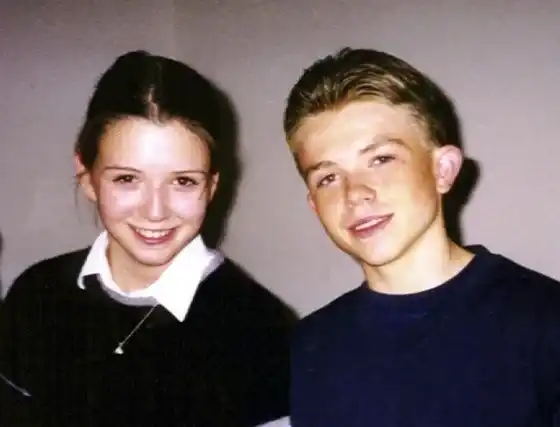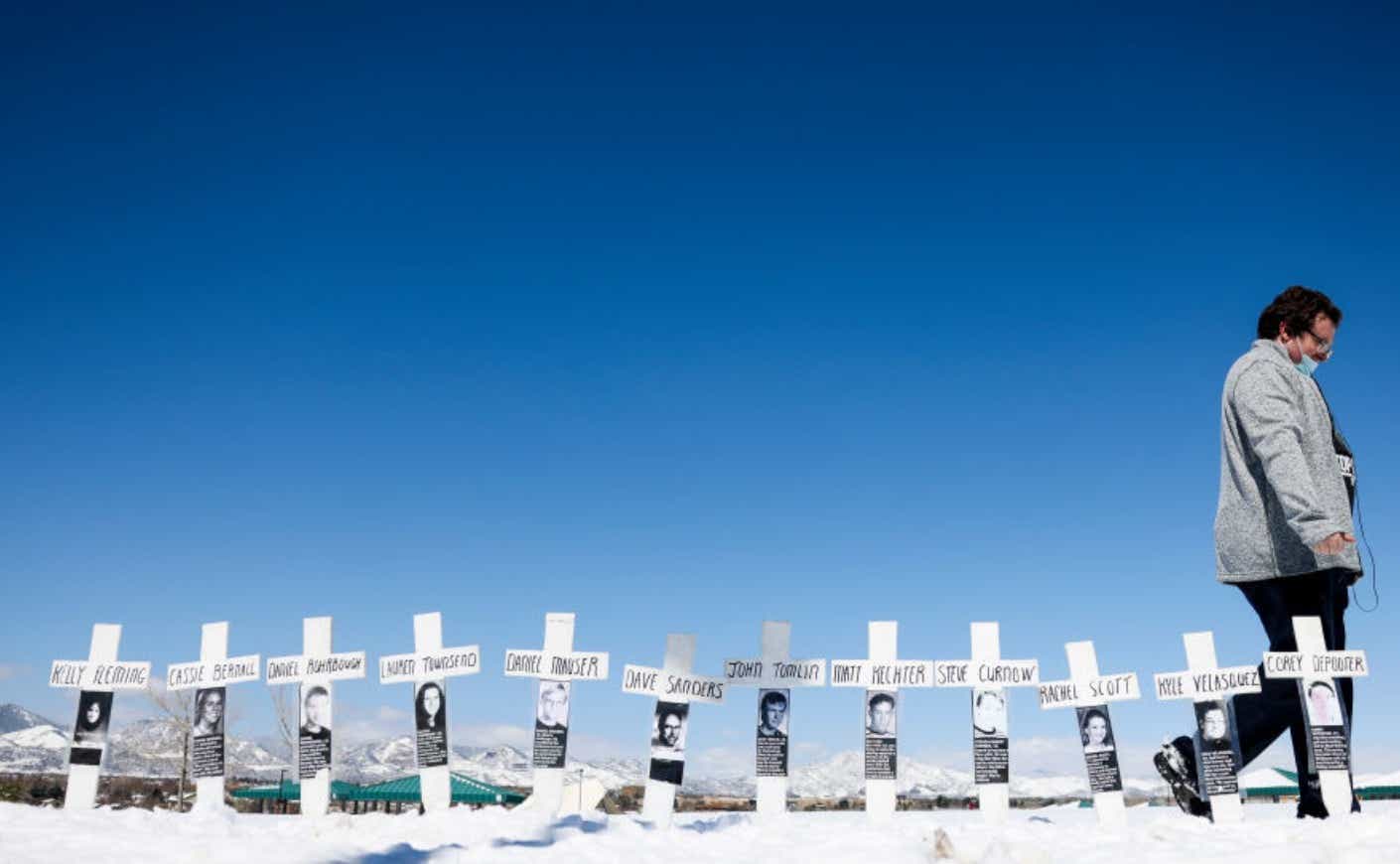On April 20, 1999, two teenagers opened fire at Columbine High School, killing 12 of their classmates and a teacher in one of America’s deadliest school shootings. The next day, with this close-knit Colorado community deep in mourning, I sat down with Craig Scott, then 16, who lost his sister Rachel, and Michael Shoels, who lost his son Isaiah.
I’ll never forget that morning: Craig, holding Michael’s hand, mustering the strength to speak about waiting for Rachel to walk out of the building as well as what he witnessed that terrifying day. Craig and I reconnected recently to reflect on that moment and Columbine’s 20th anniversary. Read our conversation below.
Katie Couric: I met you under the worst possible circumstances. What do you remember from that terrible day at Columbine High School?
Craig Scott: There are a lot of things that stand out in my mind from that day watching my friends being murdered — from hearing one of my friends being called racial slurs before his life was taken, to rallying the students to get out of there in the short time gap, to helping a girl who had her shoulder blown out from a shotgun blast. [I also remember] being behind a police car and holding a girl who, just minutes earlier, had a conversation with the killer about her faith, where they kept asking her if she believed in God, and she was begging for her life, and finally she said yes. They shot her and she made it out of the library and she survived, and I was holding her trying not to let her go to sleep because she was losing blood.
So there are a lot of things that stick with me from that day. At one point, [I remember] a friend pointing to a girl that was shot and, looking out from behind a police car, I saw a backpack and I could kind of see who it was, but I didn’t recognize her — later on, I realized she was my sister.
There are a lot of images that come with that day, but now, 20 years later, those images don’t torment me, they don’t bring me down, they don’t cause me to suffer, and so I can recount those things with reverence and sadness, but with a purpose of sharing something about that day, some lesson learned over the last 20 years and through my journey and the process I’ve gone through since then.
You were kind and brave enough to talk to me the next morning. I remember so much from our interview. The sky was pitch black. It was snowing. You came on with Michael Shoels. Before we talk about the interview, can you tell me why you were willing to talk to me that morning?
Being a teenager, I didn’t pay much attention to the news at that time, didn’t know what the TODAY Show was. So I went on the show because I knew my friend’s dad was going to be on, and I wanted to give him a hug. But [it turned out to be] the biggest interview that I’ve done and it had an impact on my life and my work.
It was the first time I would talk about my sister and about my experience. I didn’t know at that time that it would be the first of thousands of times that I would do that. That interview, and just even the connection with you over the years, has opened up a lot of doors for me to be able to speak with students because your name carries credibility with it and people have always loved your spirit in journalism and you’ve become an icon in news media.
So that interview was very important for my life, not in the sense that it was healing at the time — there would be a long journey of healing in front of me, but it was the first step. Because one of the steps is talking about it, but talking about it with a purpose and talking about it with a focus not on the bloody details, but on the positive.
We’ve stayed in touch, but I’ve never been able to find Michael Shoels. Do you know what happened to him?
All that I know is that they did sue the school and county and then they moved to Texas and then again to Tennessee. I have not stayed in touch with him over the years. The last time I did see him was at the 10-year memorial at the school. It was really great to see him — we embraced — but that’s how it is with any of the Columbine community and with any of the other victims’ families. We all have a special bond now. When you go through something hard together, even though some of us have different agendas, different beliefs as to what some of the solutions are… It doesn’t block the connection we had because when all was said and done, we were all going through something very painful.

What were the days and weeks and months and years like after this for your family?
Afterwards, I was broken to a degree, psychologically, and there was also [a break] in my spirit. At the same time, there were thousands and thousands of people praying for me… I was in a lot of shock afterwards, and I had to deal with a lot of emotions. I had to deal with a lot of sadness. I had to deal with a lot of depression at times, but the biggest emotion I’ve dealt with is anger. I hated the two shooters and I used to fantasize about what I would do if I had five minutes alone with them, and that anger really started to eat me up. In fact, there was one day that I was focusing on them and thinking about them and hating them and I was so angry and something happened and I ended up pulling a knife on someone. I was 18 years old, and I realized that my anger was making me more like them, that the very thing I was hating, I was becoming more like.
So I got the chance to go on a trip [to Africa] where I met a man who had a big impact on me. He was someone who had been through something worse than me — he had lost 17 members of his family, [including] his wife, his kids, his siblings, and his parents. And this was a man I had gotten to know over a couple of months and was a very happy and content person… [So I asked him], “How could you have gone through all that and be like this?”
He talked to me about the power of forgiveness. He said that forgiveness is like setting a prisoner free and finding out that that prisoner is you. I also learned that I could take all these negative emotions that I was having and I could translate them into something else… I started getting counseling after this trip and the psychiatrist told me you can take anger and translate it into determination, you can take sadness and translate it into an appreciation for life.
You all have honored Rachel in some wonderful and significant ways. Can you tell our readers about that?
My sister has become a real role model to millions of teenager over the years. Her story’s one of the biggest stories told in public schools today through live presentations. And after the shooting, we started hearing stories of things that she had done for other people. She had a number of journals, and in her journal she wrote about wanting to reach out to people who were hurting. She wrote an essay one month before she was killed, and my family and I decided we were going to travel around and share this essay with students. It’s called “My Ethics, My Codes of Life,” and, in it, she talked about her values and beliefs. She said, “I have this theory that if one person will go out of their way to show compassion, then it will start a chain reaction of the same.”
Now I have a program for schools called “Value Up” and I share my sister’s story in that program, but I also share my experiences and what I’ve learned. And the biggest thing I learned was the value of human life after watching friends die right next to me and losing my sister. A lot of people today don’t see themselves as having a lot of value. In fact, most people don’t think they’re truly worth being loved if people knew the real them — that if they saw the real them, they wouldn’t be worthy of the connection. I tell them they have an incredible inherent value just because they’re a live human being. The shooters at Columbine didn’t have self-worth and self-value. When I read their journals, they had a lot of self-hatred and hated themselves.
Have you ever been able to figure out why these boys, Eric Harris and Dylan Klebold, did this?
I don’t have all the reasons, but I have learned a lot about them and I believe the biggest reason they did what they did wasn’t because of bullying or parenting. It wasn’t a lack of gun control and it wasn’t a bad school — all of those are puzzle pieces and factors, but the biggest reason, the biggest cause [as to why] Columbine happened was because they chose to focus on everything that was negative in this world, and they focused on it in themselves and they started to disconnect themselves from other people.
So when people ask me, “How did Columbine happen?” I say, “Have you ever been so angry at somebody that you wanted to hurt somebody?” And they say yes and I say, “Imagine holding on to that anger every day, and imagine justifying your anger and then blaming other people for your emotions, and never taking responsibility for your own emotions.”
Did you read the book written by Dylan Klebold’s mother?
I have read parts of Sue Klebold’s book, and one of the things that I thought was really important was that it said, “We loved Dylan and we valued him, but he didn’t think he was valuable.” And that’s something I now tell kids — to believe in their value within because it affects what you choose and how you treat others.
Another thing that stood out in her book was that, in the last couple of months of Dylan’s life, he would never make eye contact with her. And that’s so important in this day and age when we can get lost and disconnected through media — even though we’re so social-media connected, we’re actually a lot more disconnected.
What has your reaction been to the many school shootings that have occurred over the years since, particularly Sandy Hook and Parkland?
When Sandy Hook happened, I felt it was more devastating, just the actual age of those who were killed and the innocence that was lost. I thought it was an even more hideous crime than what happened at Columbine. I was brokenhearted and really felt for this community. In the past [when I heard about school shootings], it used to really negatively affect me, I used to get depressed and sometimes angry. Now, I’m still brokenhearted for it, but it reignites my purpose. It almost becomes fuel for what I’m doing. I take anger and turn it into determination.

How will this anniversary be commemorated? How will you spend the day?
In the morning, I’m going to the school and will be with the other victims’ families. [Columbine’s principal, Frank DeAngelis] will read the names of the victims and we’ll have some time with other families who we’ve built friendships with. At 3 p.m., I’ll go to the park next to the school, Clement Park, where you and I did our first interview together, for a memorial.
The rest of the evening I’ll spend with my mom and my siblings at her house and just be with those who I love. I try not to allow myself to get too heavy-hearted. I’ve been through the healing process, so I want to celebrate their lives and honor those who were lost, but for me it’s more about recommitting to what it is that I do now and the people I love now. So this 20th anniversary, I’m just going to take time to value my family and value my friends from Columbine.
This interview has been edited and condensed.









